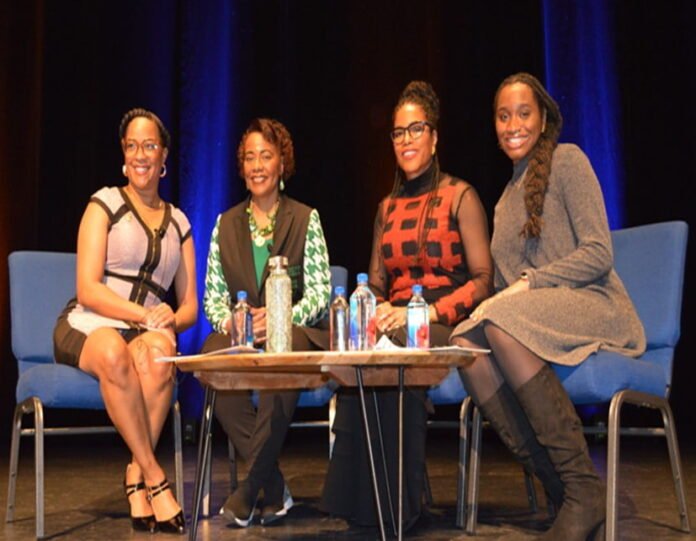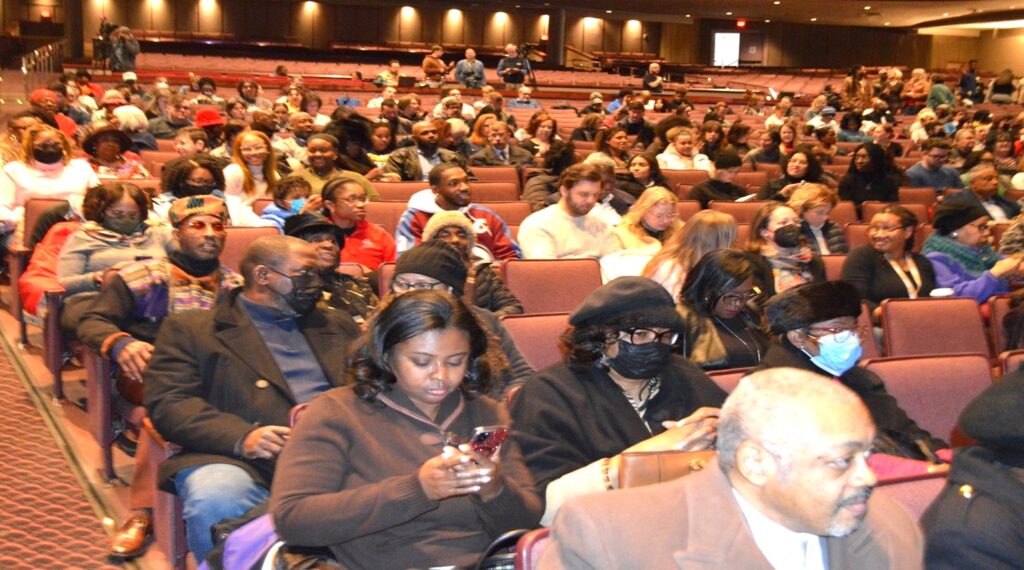

By Peyton Schultz
Dr. Bernice King and Dr. Ilyasah Shabazz, a pair of celebrated social justice activists, motivational speakers and daughters of two of the most influential civil rights leaders, were the keynote speakers at the University of Tennessee at Chattanooga MLK Day 2024 on Friday, Jan. 19, at Soldiers and Sailors Memorial Auditorium.
Held in an off-campus venue for the first time due to high demand, the event brought together community members and UTC students, faculty and staff.
The event theme, “A Legacy of Leadership and Service,” was moderated by UTC Vice Chancellor for Access and Engagement Stacy Lightfoot and UTC Student Government Association President Chamyra Teasley.
King, a prominent minister, attorney and the daughter of Martin Luther King Jr., is the CEO of the Martin Luther King Jr. Center for Nonviolent Social Change–also known as the King Center. Shabazz, the author of five historical novels and the daughter of Malcolm X, is the chairperson of the Malcolm X and Dr. Betty Shabazz Memorial and Educational Center.
Together, they sat on the Memorial Auditorium stage and discussed the legacy of their fathers, their journeys to activism and carrying on their fathers’ missions for racial equality.
King and Shabazz both stressed that studying their fathers’ names equally is important to comprehending the civil rights movement.
“Malcolm and Martin don’t have to be presented as a conflict,” King said. “A lot of times we put people in a position of ‘I’m a Malcolm. I’m a Martin.’ You can be both.”
Shabazz said that one person cannot make change, but a “village” of people can.
“There’s always some kind of divisive tactic to keep us separated because we know that there are more good people in the world than there are bad. But we want to focus on Black; we want to focus on white,” Shabazz said.
“It’s your generation that gets it, and they understand that the only way we are going to accomplish these goals is by getting this boot off of all of our necks. It’s by coming together.”
When asked what motivated her to convey her message to the masses, King said it was the anger she felt after her father’s assassination and the oppression in the Black community.
“It wasn’t until I became CEO of the King Center that what my father left for us became real–his philosophy and methodology of non-violence,” she said. “It began to really help me to find the way to channel that anger into something more positive so that I can also be a vessel for change and transformation.”
The two shared their fathers’ core values, some of which they believe have become misrepresented over time.
“My mother, as a grown woman, had to safeguard her husband’s legacy because of all these negative and horrible things that they said about him,” Shabazz said.
“He believed in our humanity and he believed that America should live up to her promise of liberty and justice for all of its citizens.”
For King, it’s the misuse of one of her father’s most famous quotes: “I have a dream that my four little children will one day live in a nation where they will not be judged by the color of their skin, but by the content of their character.”
“My father did not want us not to recognize color or culture or respect that and understand that, recognize that and embrace that,” she explained. “He was talking about a world after we addressed and eradicated racism.”
While there has been significant change since the days of their fathers’ assassinations, King and Shabazz both said there is more to be done, citing unequal voting rights, poverty and the racial disparities that exist in systems and institutions.
“There are things happening right now that could very much restore the essence of what was happening in the ’50s and ’60s,” King said.
“Please, let’s not mistake where we are today,” she added. “We are not where we used to be, but we could be.”
Shabazz stressed the importance of properly educating youth on Black history and the civil rights movement.
“We’re approaching Black History Month,” she said, “and now we are understanding that Black history is not just for February, but that Black history in America is American history.
“As an educator, I feel it is important to make sure that you are receiving accurate information. Educators have a responsibility and an opportunity to ensure that our young people are receiving the values of honesty, compassion and forgiveness, recognizing the truth that happened in this contemporary country.”
King said the way to change is to demonstrate that people don’t fall for divisive tactics while coming together strategically to address challenges and accomplish goals.
“As daddy said, ‘Hate cannot drive out hate. Only love can do that,’” she said. Other speakers included UTC Chancellor Steven R. Angle; Dr. Tara Mathis, associate dean of students and director of the Multicultural Center; Christopher Stokes, assistant director of the Office of Multicultural Affairs; and Sherese Williams, director of Operations and Admissions for the UTC Honors College and president of the University’s Black Faculty and Staff Association.
